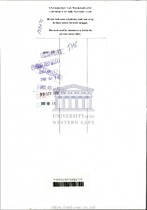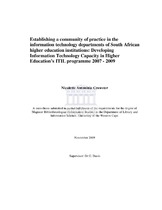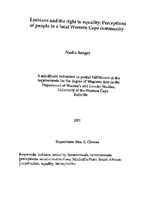| dc.description.abstract | This study investigates how two groups of African pupils, namely the low and high performers in standard 9 mathematics classes in some high schools in Mangaung, construct meaning of their African cultural, individual African identity and performance in mathematics respectively. The observation underpinning this investigation is that social structural factors have not gained much attention in research as bases for explaining differentiated performance in mathematics, hence this study. To arrive at the findings mentioned below, the study used three quantitative instruments namely Mboya's Self-Description Inventory II (MSDI-II), Rotter's I-E scale and Tuekman's Mathematics Attitude Scale (MAS). Four hundred pupils who constituted the sample that responded to these questionnaires were controlled as to confounding variables like, gender, social class, exposure to mathematics and future aspirations relating to this subject. MSDI-II and Rotter's I-E Scale accessed data relating to signification of African individual identity while MAS and one of MSDI-Il's subscale, Maths Ability were 'triangulated' to access data
relating to signification of performance in Mathematics. To triangulate findings on these two variables as well as to allow the sampled pupils' voices to be heard, discourse analysis was conducted on the open interviews with the two groups of low and high performing pupils in
their respective schools. This qualitative approach also enabled the study to access information relating to signification of African Cultural Identity. No quantitative instrument was found suitable for this purpose. Although the study is careful not to make strong causal inferences between meaning construction (signification) and performance, the results show that (i) low performers are not sure about whether they are Africans or not since according to them African cultural identity implies an obsolete and primitive way of doing things. They are unable to identify with this. High performers see African Cultural Identity as involving lived experiences which challenge them to transform their despised status as Africans (ii) Low performers are not as positive as high performers about Africanness (individual identity) and (iii) they are also not positively inclined towards mathematics and their own ability to perform well therein, while high performers are very positive as they see doing well in mathematics as an act of struggle that would enable them to improve their social standing and that of other Africans. On the basis of the above the study is able to conclude that low performers construct meaning of the mentioned factors in agreement with the dominant discourses that see Africanness as being primitive, incompetent and unable to adequately comprehend the intricacies of modem day subjects like mathematics. High performers on the other hand tend to contest this negative definitions about what it means to be an African (identity, culture and performance in mathematics). They are thus positioned within counter-hegemonic ideology and discourses in as far as their meaning construction is concerned. Grounded on the above findings and conclusions, the study recommends that efforts should not be spared to enable the low performers (and/or pupils at risk of failing) to adopt positive meaning making strategies of high performers. These strategies may be accompanied by enhanced positive feelings about self and what one is capable of, which may in tum also impact positively on performance in mathematics, in particular. The research further argues that this goal may be achieved through curriculum enrichment, guidance, counselling and teaching, couched in the framework of African Renaissance. Therefore further research needs to be conducted that will elaborate clearly (i) what the implications of African Renaissance are on education, teaching, learning and mathematics curriculum in particular, (ii) what are the most effective means of transferring high performers' strategies of meaning construction to the low performers in the context of African Renaissance and (iii) how to strengthen and further sustain the positive meaning making strategies among high performers. Recommendations relating to curriculum enrichment in the context of Curriculum 2005 and
Outcomes Based Counselling are also made as well as suggestions for future relevant research based on the concepts generated in this research. | en_US |




